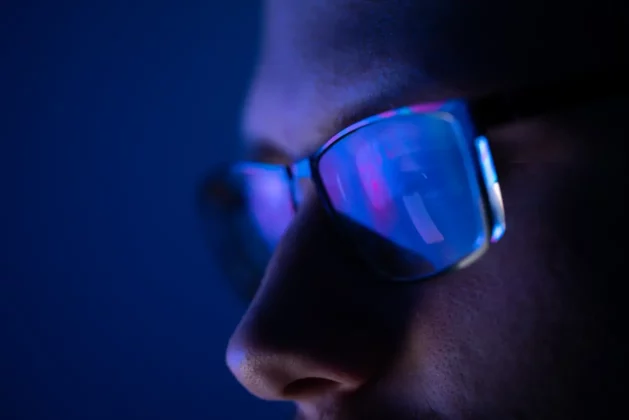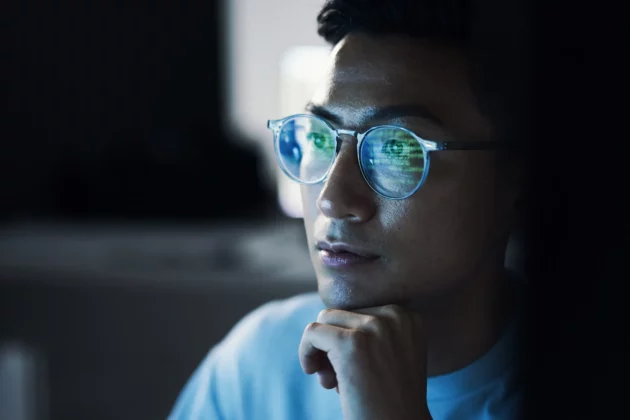With the rise of smartphones, laptops, and televisions in our daily lives, our eyes are working overtime, especially in today’s digital age. But have you ever noticed after a long day of screen time, your eyes feel strained or tired? The culprit might be the blue light emitted from these screens. There’s been a lot of buzz about blue light filter glasses as a solution. But the question that pops up in our minds is, “Do these glasses genuinely help?” Dive into this guide as we unravel the mystery of blue light and explore whether these popular glasses live up to the hype.
Contents
Understanding Blue Light and Its Impact on Our Eyes
 Every day, whether we realize it or not, our eyes are exposed to a spectrum of colors of light. Blue light, a naturally occurring component of this spectrum, has a shorter wavelength and more energy compared to other visible lights. But where does it come from?
Every day, whether we realize it or not, our eyes are exposed to a spectrum of colors of light. Blue light, a naturally occurring component of this spectrum, has a shorter wavelength and more energy compared to other visible lights. But where does it come from?
- Natural Source: The primary source of blue light is the sun. That’s right! Those lovely blue skies we admire on a clear day? That’s the sun’s blue light scattered everywhere.
- Digital Sources: Apart from the sun, blue light is emitted in significant amounts from digital devices such as smartphones, computers, televisions, and LED lighting. As our screen time increases, so does our exposure to this artificial source of blue light.
- Position in the Spectrum: Blue light sits right next to UV light on the light spectrum. While UV light isn’t visible to the human eye, blue light is, and it’s what gives our screens that bright, vivid color.
Now that we’ve understood what blue light is and its sources let’s dive into how it affects our eyes.
The Impact of Blue Light on Our Eyes
Our constant interaction with screens, especially in the evenings, exposes our eyes to an ample amount of artificial blue light, and this has raised concerns among eye care professionals:
- Digital Eye Strain: Have you ever felt a headache or dry eyes after staring at your screen for too long? This discomfort is often termed “digital eye strain” or “computer vision syndrome.” The high energy and flickering of blue light can cause fatigue faster than other light types.
- Circadian Rhythm Disruption: Our sleep patterns, or circadian rhythms, can get disturbed by overexposure to blue light, especially during the evening. Blue light tricks our brain into thinking it’s still daytime, making it harder for us to wind down and fall asleep.
- Potential Long-Term Effects: While research is ongoing, prolonged exposure to blue light might increase the risk of specific eye conditions, including age-related macular degeneration.
In essence, while blue light is a natural part of our environment, the modern digital age has amplified our exposure, especially from artificial sources. As we delve deeper into the world of blue light filter glasses, understanding blue light’s nature and its effects is crucial to making informed decisions about our eye health.
Introducing Blue Light Filter Glasses

In today’s digital era, as concerns about the prolonged exposure to blue light grow, a specific eyewear has gained immense popularity — the blue light filter glasses. But what are they, and how do they work?
What Are Blue Light Filter Glasses?
Blue light filter glasses, as their name suggests, are specially designed eyeglasses aimed at reducing or filtering out the blue light emitted from digital screens. They’re not just for those who require prescription glasses; even individuals with perfect vision can wear them to shield their eyes from excessive blue light.
Design and Functionality
- Lens Coating: These glasses have a unique coating on the lens that reflects and absorbs a portion of the blue light, preventing it from passing through to your eyes.
- Tint: Some blue light glasses come with a subtle yellow or amber tint. This tint further assists in neutralizing the effects of blue light, providing better contrast on screens and reducing glare.
- Material: Advanced polymers are infused into the lens materials, which inherently block or absorb the blue light wavelengths. This ensures that the filtering mechanism doesn’t just rely on the lens’s coating.
The Primary Purpose
The main goal of blue light filter glasses is to lessen digital eye strain, alleviate the symptoms associated with prolonged screen time, and potentially improve sleep quality by reducing blue light’s impact on circadian rhythms.
For many, especially those whose work revolves around screens, these glasses have become an essential part of daily life. They offer a barrier, a shield of sorts, against the potential adverse effects of our screen-centric routines. Whether you’re binge-watching your favorite show or working on a presentation, blue light filter glasses aim to make the experience more comfortable for your eyes.
Benefits of Wearing Blue Light Filter Glasses
The increasing reliance on digital devices has spotlighted the importance of eye care, leading many to explore the advantages of blue light filter glasses. So, let’s delve into the myriad advantages that users might experience:
- Reduced Digital Eye Strain
One of the most immediate benefits noticed by wearers is a decrease in digital eye strain symptoms. - Improved Sleep Patterns
Excessive blue light exposure, especially during the evening, can disrupt our natural circadian rhythm. By filtering out this light, wearers might find it easier to fall asleep and experience a better quality of sleep overall. - Lower Risk of Eye Health Issues
While research is still ongoing, some studies suggest that chronic exposure to blue light might increase the risk of conditions like macular degeneration. Wearing blue light glasses could potentially offer a layer of protection. - Enhanced Visual Comfort
These glasses can improve visual contrast, making digital content more comfortable to view. This is especially helpful during activities like reading, gaming, or graphic designing, where clear visuals are crucial. - Reduced Glare
The specialized coatings on blue light filter glasses can minimize the glare from screens, further adding to the visual comfort and reducing potential distractions during tasks. - Prevention of Headaches
Many users have reported fewer headaches after switching to blue light glasses, especially those who previously experienced migraines triggered by screen usage. - Adaptable Styles
Beyond functionality, blue light glasses have evolved in design, allowing wearers to choose from a range of stylish frames. This means they can easily be integrated into daily life, complementing both professional and casual looks.
Incorporating blue light filter glasses into one’s routine, especially for those who spend significant hours in front of screens, can offer a blend of health and comfort benefits.
Common Criticisms About These Glasses
In the vast domain of eye care, where innovations are welcomed with both eagerness and caution, blue light filter glasses have not been exempt from skepticism. As with any popular product, it’s crucial to explore some of the common criticisms to ensure a holistic understanding:
- One of the primary criticisms revolves around the lack of extensive scientific research confirming the benefits of blue light glasses. While many studies support their advantages, critics argue that more rigorous, long-term research is needed.
- Some experts believe that the harm from screen-emitted blue light might be overstated.
- Blue light glasses can sometimes be pricier than standard eyewear. Critics question whether the potential benefits justify the additional costs, especially in the absence of unequivocal scientific backing.
- There’s a concern that wearing these glasses might give users a false sense of security, leading them to overlook other essential eye care practices, like taking regular screen breaks or ensuring proper lighting.
It’s vital to approach the topic of blue light glasses (or any health product, for that matter) with a balanced perspective. While many swear by their benefits, being aware of criticisms allows consumers to make well-informed decisions based on a broad spectrum of information.
Choosing the Right Pair for You
Selecting the perfect pair of blue light filter glasses requires a mix of practicality and personal preference. Here’s a quick guide to help you make the best choice:
- Determine Your Needs: Consider how many hours you spend in front of screens daily. If you’re often on devices, you might want a pair with a higher blue light filtering percentage.
- Budget: Blue light glasses vary in price. Set a budget but remember, sometimes you’re paying for lens quality, which can be crucial.
- Lens Quality: Ensure the lenses are genuinely designed to filter blue light. Some cheaper models might only have a tint without the necessary filtering capabilities.
- Frame Design: Comfort is vital. Opt for a design that suits your face shape and feels good even after extended wear.
- Aesthetics: Just because they’re functional doesn’t mean they can’t be stylish. Many brands offer trendy designs that can complement your look.
- Customer Reviews: Before purchasing, check out reviews from other users. This can provide insights into the glasses’ comfort, durability, and effectiveness.
Remember, the perfect pair should feel right both in terms of comfort and vision. Don’t hesitate to try out a few different options before settling on your ideal match.
Conclusion
In our digital age, the health of our eyes is more critical than ever before. The constant exposure to screens has heightened the importance of understanding and mitigating the effects of blue light. Blue light filter glasses are one of the many innovations designed to offer protection and comfort. But, like any health decision, it’s essential to be informed, understand the pros and cons, and choose what feels right for you.
Your eyes aren’t just windows to your soul but also to the world around you. They deserve the best care and attention. Are your eyes craving that much-needed attention? Don’t wait. Prioritize your eye health today. Book your free appointment at the Best Eye Hospital in India or call us on 9711116605. Give your eyes the care they truly deserve.



